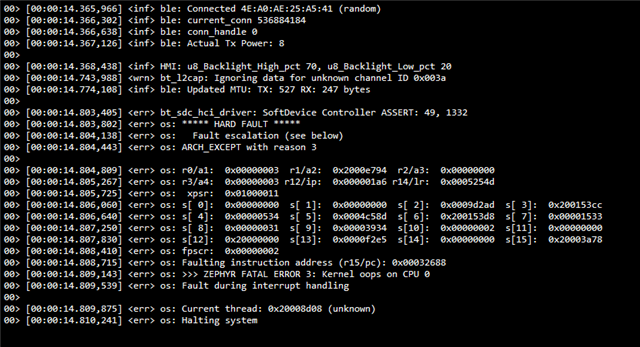In our application build with SDK 2.7.0 on a NRF52840 chip, we get an assert if we update the TX_Power for the connections.
If the bluetooth has made connection, we update the TX power.
}
static void connected(struct bt_conn *conn, uint8_t err)
{
char addr[BT_ADDR_LE_STR_LEN];
int ret;
if (err) {
LOG_ERR("Connection failed (err %u)", err);
return;
}
bt_addr_le_to_str(bt_conn_get_dst(conn), addr, sizeof(addr));
LOG_INF("Connected %s", addr);
current_conn = bt_conn_ref(conn);
LOG_INF("current_conn %d", current_conn);
ret = bt_hci_get_conn_handle(current_conn,&conn_handle);
LOG_INF("conn_handle %d", conn_handle);
if (ret)
{
LOG_ERR("No connection handle (err %d)\n", ret);
}
else
{
set_tx_power(BT_HCI_VS_LL_HANDLE_TYPE_CONN, conn_handle, TX_POWER);
}
}
static void set_tx_power(uint8_t handle_type, uint16_t handle, int8_t tx_pwr_lvl)
{
struct bt_hci_cp_vs_write_tx_power_level *cp;
struct bt_hci_rp_vs_write_tx_power_level *rp;
struct net_buf *buf, *rsp = NULL;
int err;
buf = bt_hci_cmd_create(BT_HCI_OP_VS_WRITE_TX_POWER_LEVEL,
sizeof(*cp));
if (!buf) {
LOG_ERR("Unable to allocate command buffer\n");
return;
}
cp = net_buf_add(buf, sizeof(*cp));
cp->handle = sys_cpu_to_le16(handle);
cp->handle_type = handle_type;
cp->tx_power_level = tx_pwr_lvl;
err = bt_hci_cmd_send_sync(BT_HCI_OP_VS_WRITE_TX_POWER_LEVEL,
buf, &rsp);
if (err) {
uint8_t reason = rsp ?
((struct bt_hci_rp_vs_write_tx_power_level *)
rsp->data)->status : 0;
LOG_INF("Set Tx power err: %d reason 0x%02x\n", err, reason);
return;
}
rp = (void *)rsp->data;
LOG_INF("Actual Tx Power: %d\n", rp->selected_tx_power);
net_buf_unref(rsp);
}
code works fine if we disable the row: set_tx_power(BT_HCI_VS_LL_HANDLE_TYPE_CONN, conn_handle, TX_POWER);

